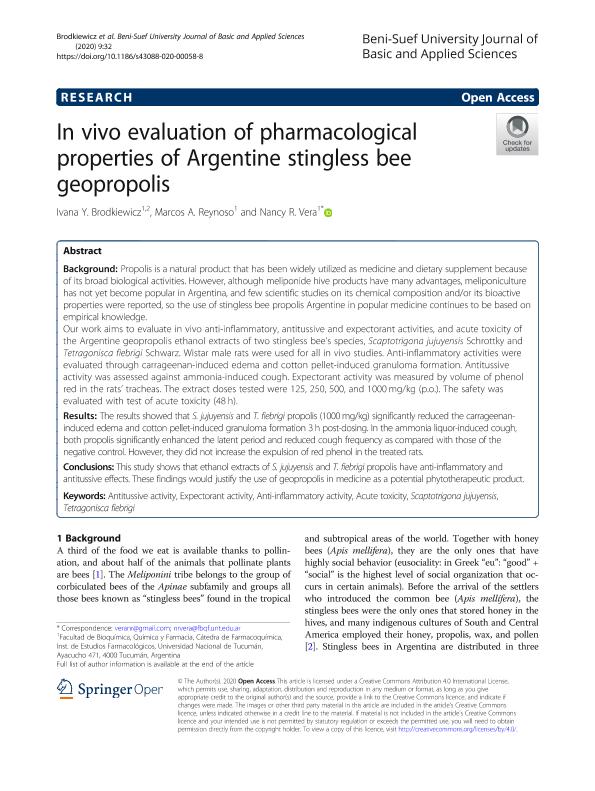Mostrar el registro sencillo del ítem
dc.contributor.author
Brodkiewicz, Ivana Yanina

dc.contributor.author
Reynoso, Marcos Adrian

dc.contributor.author
Vera, Nancy Roxana

dc.date.available
2021-09-20T13:42:45Z
dc.date.issued
2020-12
dc.identifier.citation
Brodkiewicz, Ivana Yanina; Reynoso, Marcos Adrian; Vera, Nancy Roxana; In vivo evaluation of pharmacological properties of Argentine stingless bee geopropolis; Springer Science and Business Media Deutschland GmbH; Beni-Suef University Journal of Basic and Applied Sciences; 9; 32; 12-2020; 1-8
dc.identifier.issn
2314-8543
dc.identifier.uri
http://hdl.handle.net/11336/140843
dc.description.abstract
Propolis is a natural product that has been widely utilized as medicine and dietary supplement because of its broad biological activities. However, although meliponide hive products have many advantages, meliponiculture has not yet become popular in Argentina, and few scientific studies on its chemical composition and/or its bioactive properties were reported, so the use of stingless bee propolis Argentine in popular medicine continues to be based on empirical knowledge. Our work aims to evaluate in vivo anti-inflammatory, antitussive and expectorant activities, and acute toxicity of the Argentine geopropolis ethanol extracts of two stingless bee’s species, Scaptotrigona jujuyensis Schrottky and Tetragonisca fiebrigi Schwarz. Wistar male rats were used for all in vivo studies. Anti-inflammatory activities were evaluated through carrageenan-induced edema and cotton pellet-induced granuloma formation. Antitussive activity was assessed against ammonia-induced cough. Expectorant activity was measured by volume of phenol red in the rats’ tracheas. The extract doses tested were 125, 250, 500, and 1000 mg/kg (p.o.). The safety was evaluated with test of acute toxicity (48 h). Results: The results showed that S. jujuyensis and T. fiebrigi propolis (1000 mg/kg) significantly reduced the carrageenan-induced edema and cotton pellet-induced granuloma formation 3 h post-dosing. In the ammonia liquor-induced cough, both propolis significantly enhanced the latent period and reduced cough frequency as compared with those of the negative control. However, they did not increase the expulsion of red phenol in the treated rats. Conclusions: This study shows that ethanol extracts of S. jujuyensis and T. fiebrigi propolis have anti-inflammatory and antitussive effects. These findings would justify the use of geopropolis in medicine as a potential phytotherapeutic product. Graphical abstract: [Figure not available: see fulltext.]
dc.format
application/pdf
dc.language.iso
eng
dc.publisher
Springer Science and Business Media Deutschland GmbH
dc.rights
info:eu-repo/semantics/openAccess
dc.rights.uri
https://creativecommons.org/licenses/by/2.5/ar/
dc.subject
ACUTE TOXICITY
dc.subject
ANTI-INFLAMMATORY ACTIVITY
dc.subject
ANTITUSSIVE ACTIVITY
dc.subject
EXPECTORANT ACTIVITY
dc.subject
SCAPTOTRIGONA JUJUYENSIS
dc.subject
TETRAGONISCA FIEBRIGI
dc.subject.classification
Otras Ciencias Biológicas

dc.subject.classification
Ciencias Biológicas

dc.subject.classification
CIENCIAS NATURALES Y EXACTAS

dc.title
In vivo evaluation of pharmacological properties of Argentine stingless bee geopropolis
dc.type
info:eu-repo/semantics/article
dc.type
info:ar-repo/semantics/artículo
dc.type
info:eu-repo/semantics/publishedVersion
dc.date.updated
2021-07-30T18:53:38Z
dc.journal.volume
9
dc.journal.number
32
dc.journal.pagination
1-8
dc.journal.pais
Egipto

dc.journal.ciudad
Ain Shams
dc.description.fil
Fil: Brodkiewicz, Ivana Yanina. Universidad Nacional de Tucuman. Facultad de Bioquímica, Química y Farmacia. Instituto de Farmacia. Cátedra de Farmacoquímica; Argentina. Consejo Nacional de Investigaciones Científicas y Técnicas. Centro Científico Tecnológico Conicet - Tucumán; Argentina
dc.description.fil
Fil: Reynoso, Marcos Adrian. Universidad Nacional de Tucuman. Facultad de Bioquímica, Química y Farmacia. Instituto de Farmacia. Cátedra de Farmacoquímica; Argentina. Consejo Nacional de Investigaciones Científicas y Técnicas. Centro Científico Tecnológico Conicet - Tucumán; Argentina
dc.description.fil
Fil: Vera, Nancy Roxana. Universidad Nacional de Tucuman. Facultad de Bioquímica, Química y Farmacia. Instituto de Farmacia. Cátedra de Farmacoquímica; Argentina
dc.journal.title
Beni-Suef University Journal of Basic and Applied Sciences
dc.relation.alternativeid
info:eu-repo/semantics/altIdentifier/url/https://bjbas.springeropen.com/articles/10.1186/s43088-020-00058-8
dc.relation.alternativeid
info:eu-repo/semantics/altIdentifier/doi/http://dx.doi.org/10.1186/s43088-020-00058-8
Archivos asociados
